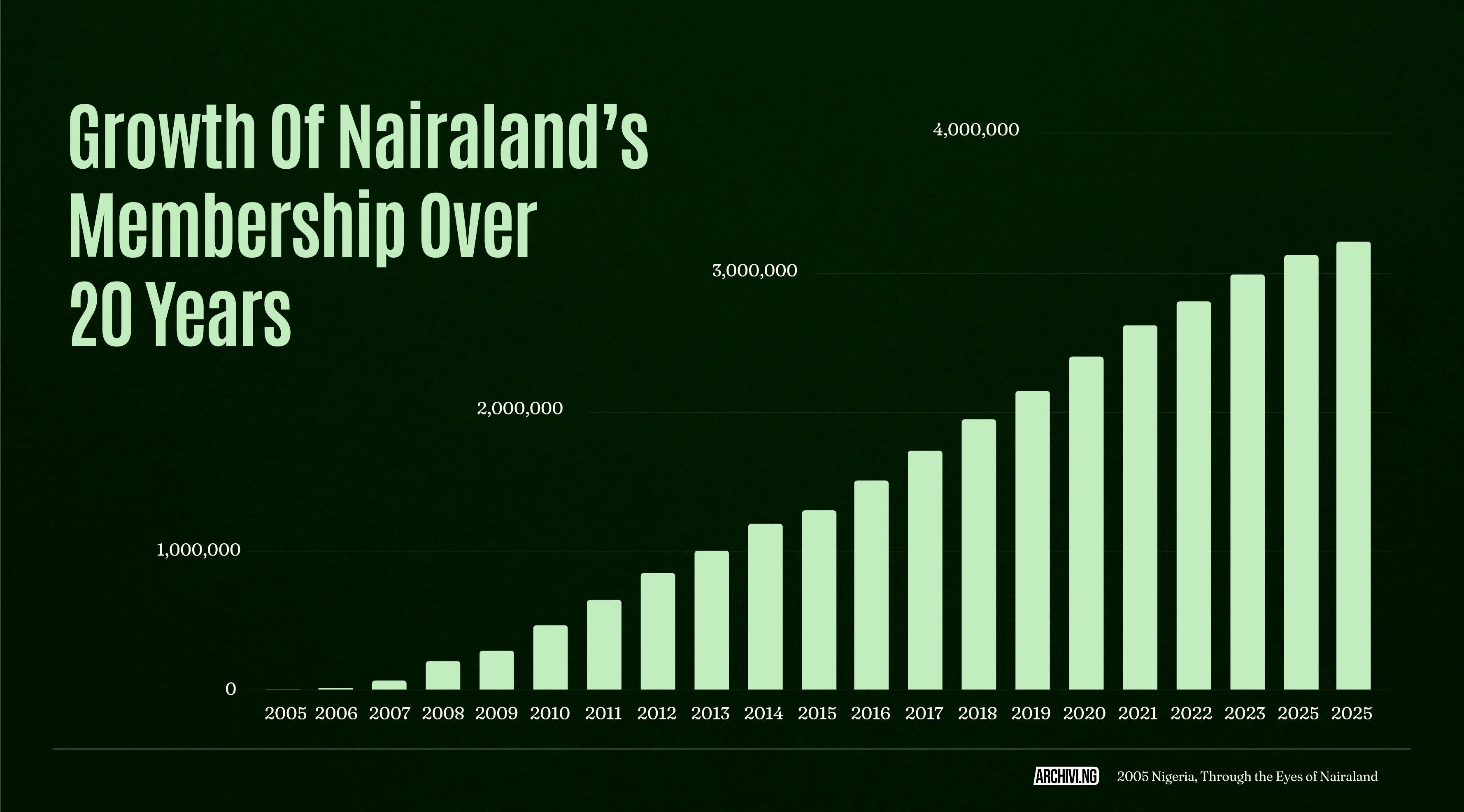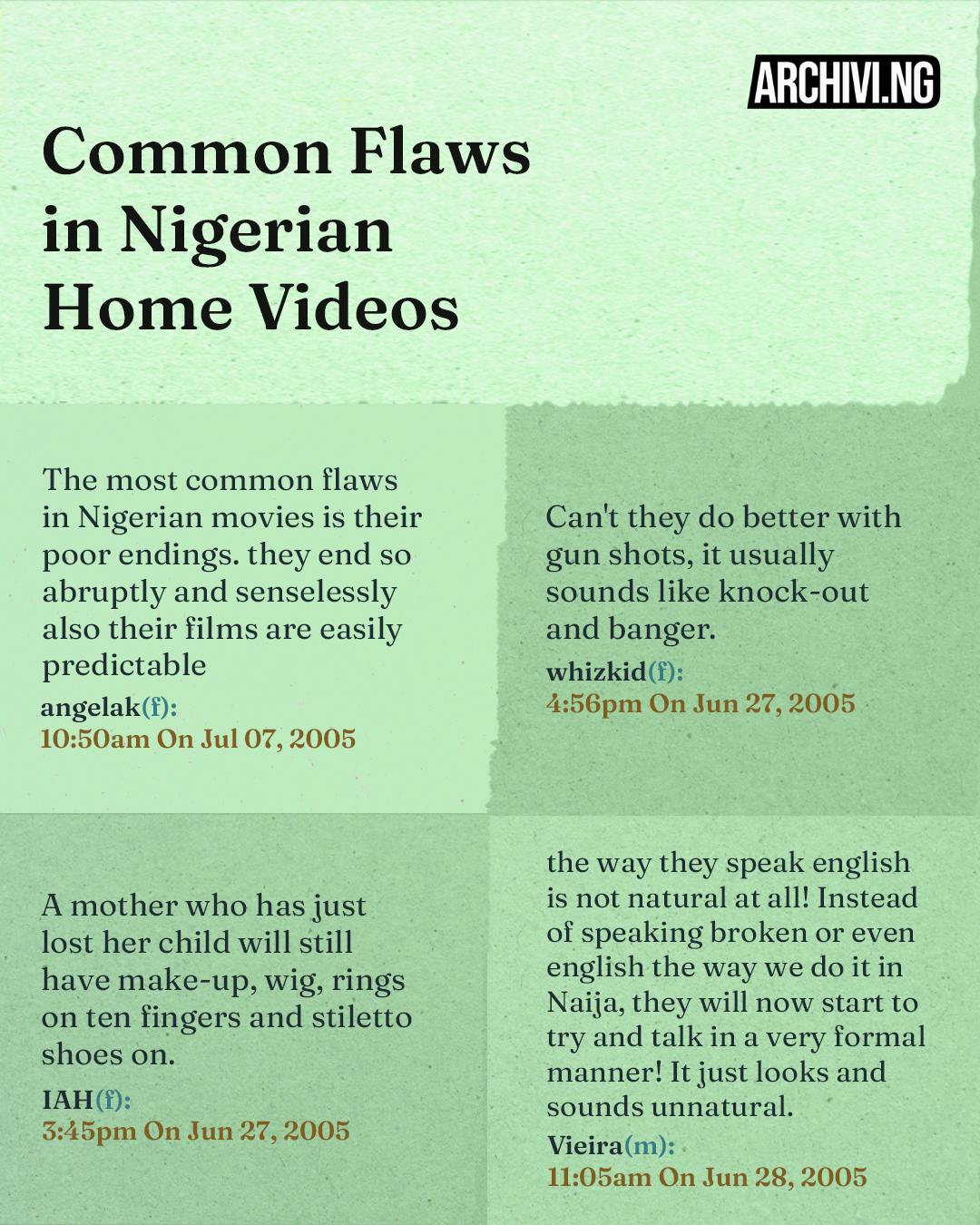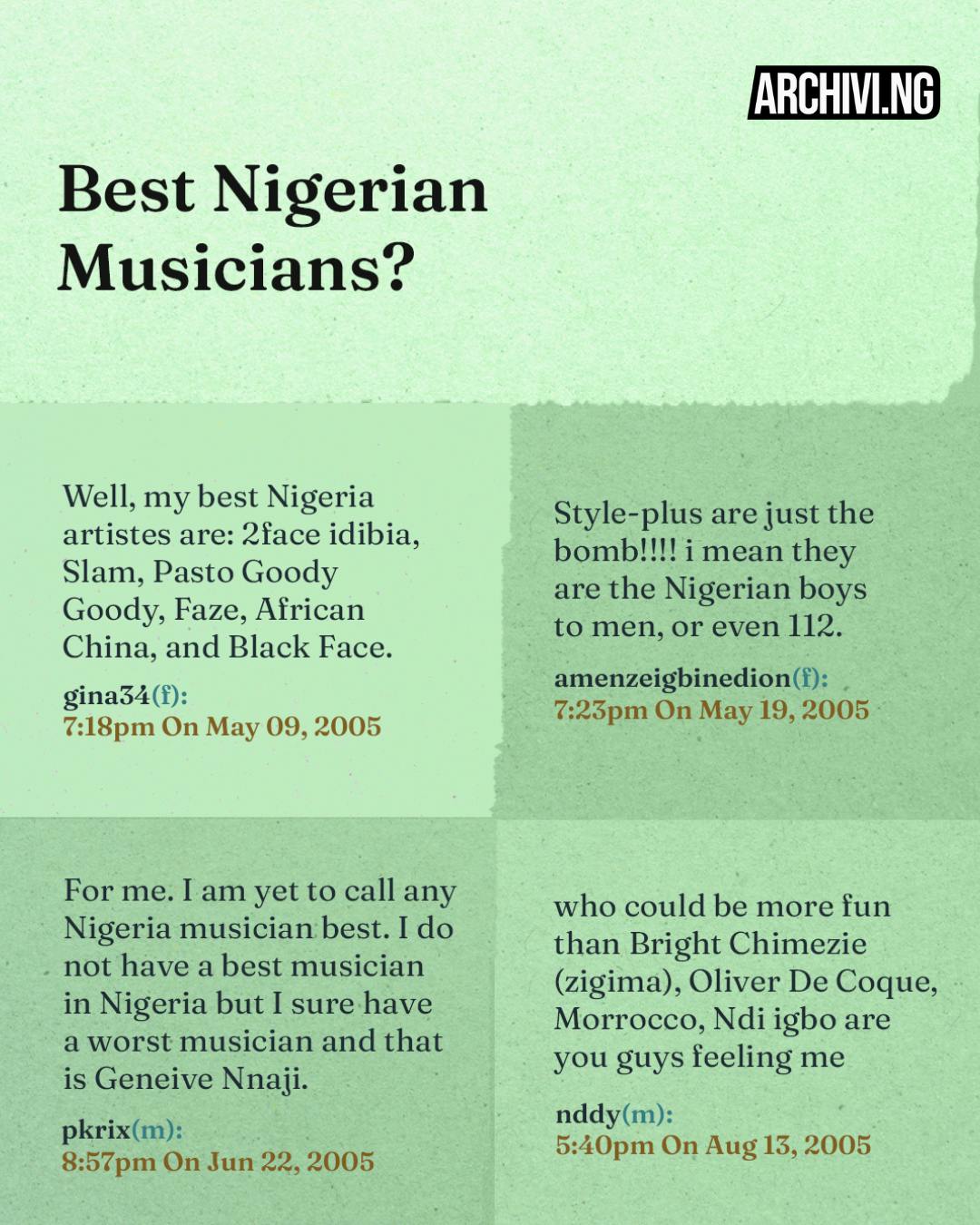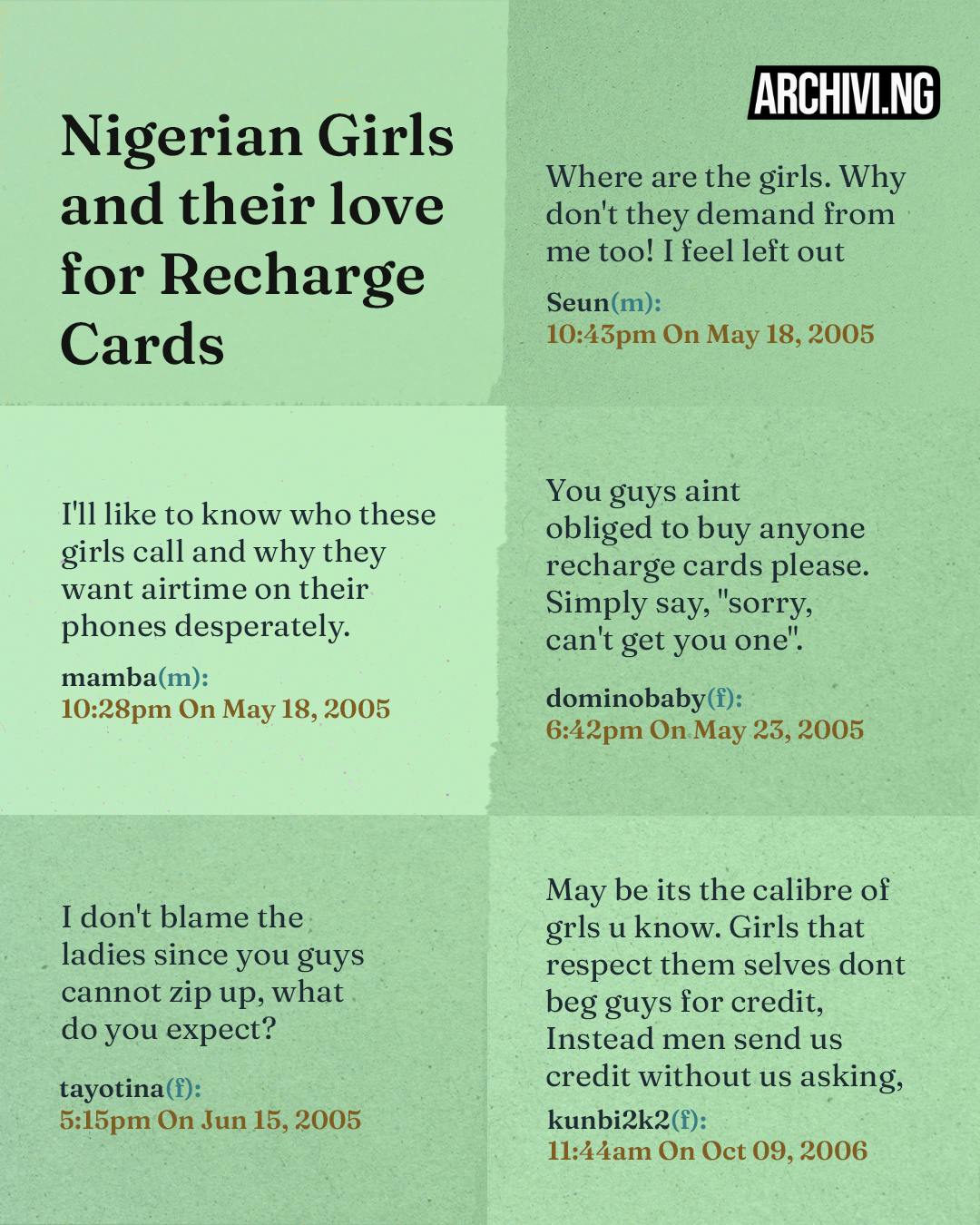2005 Nigeria, Through the Eyes of Nairaland
A lot happened in 2005.
It was the year Nigeria introduced the ₦1,000 note and raised the petrol pump price from ₦61 to ₦80. It was the year Governor Alamieyeseigha of Bayelsa escaped a money laundering trial in the UK by dressing as a woman—allegedly. It was the year Nigeria lost over 200 lives to two plane crashes within two months, and lost the first lady to a liposuction surgery abroad.
It was also the year 22-year-old Seun Osewa founded Nairaland, because of which, not only can we read about all these events, but we also get to see how Nigerians reacted to them as they happened. Seun intended to create an online forum for people to report breaking news, share their experiences and opinions, and ask questions. Within two years, the platform grew to over 100,000 registered users. In eight years, the membership strength rose to a million, and that number has more than tripled today.
Nairaland was how Nigerians, home and abroad, interacted before Facebook and Twitter went public, and even predates 2go. It was the online village market square, full of strange characters and ideas. Whatever your interests were, you were sure to find people discussing some of them.
In the entertainment forum, you could talk about your favourite songs, movies, and TV shows, recommend books you like, and discuss football and computer games. You could also rant about the things you didn’t enjoy. In the life forum, people were expected to talk about pets, food, health, beauty, family, housework, relationships, cars, politics, and religion. “Are we, or are we not, reaping the dividends of democracy?” said the tagline for the politics sub-forum.
Despite losing some of its files to a hacking incident in 2014, Nairaland is remarkably well-preserved. Its long shelf life means that it also serves as a form of archive for news articles whose original publications can no longer be accessed. On the website, you will still find posts dating back to its founding year. With the help of the Wayback Machine, you can find many of the missing pieces and scroll through a timeline of publications like a time-travelling archaeologist.
For a country that’s only three generations old, a 20-year leap into the past can be quite revealing. So, what can we learn from two decades-old posts and conversations on Nairaland?

One, you quickly realise that many of the problems Nigeria faces today, and many of the solutions proposed to counter them, have been around for a long time. People staying home during elections because they fear there will be violence. Nigeria’s government gradually removing subsidies on fuel and electricity because they are not “sustainable.” ECOWAS taking forever to launch the Eco currency for West African countries. Today, we have clerics telling their followers that artificial intelligence is a demonic fallen angel and that 5G technology is a sign of the end times, but it is not the first time we’ll be seeing fear-mongering related to new technology. Twenty years ago, people believed that if they dialled or received calls from certain numbers, they would die on the spot. Some avoided phones altogether.
However, you come to realise other things, too. For example, Nigerians weren’t as sold on the japa promise as they are now. Recent surveys have shown that in every group of ten Nigerians, about six to seven are inclined to leave the country if presented with the opportunity. In contrast, many Nigerians preferred to remain in their country a few decades ago. In June 2005, someone created a post on Nairaland seeking opinions about the trend of Nigerians wanting to relocate to the United States. A sentiment analysis of the responses from 36 users shows that half of them were overwhelmingly in support of staying in Nigeria, a quarter of the responders were neutral, and another quarter supported relocating abroad (because of poor living standards and a lack of support for talent growth).
“The US was worse than Nigeria when it was 100 years old. Nigeria is only 45; it still has a very bright future!” wrote WesleyanA, who describes herself as a proud patriot. In another post, where someone asks whether to stay and work in the UK or return to Nigeria, people argued that the better decision is to come back to build their home country. “I plan to return,” replied one Nigerian who also lived in the UK. “If the power sector can open up like the telecom sector, I'll be there in a heartbeat.”
We find bits of patriotism in conversations like these; we find them in how people were eager to make Nigeria’s national anthem their mobile ringtone; and we find them in growing interests in local Afrobeats talents.
Become an ARCHIVI.NG member and get updates straight to your inbox
Speaking of Entertainment
The movies and music sections of Nairaland are free tickets to the so-called good old days.
One thread about favourite movies is full of recommendations from Hollywood. Bourne Supremacy. Finding Forrester. Resident Evil. Shawshank Redemption. The Godfather. The Last Samurai. The Lord of the Rings. The Matrix. At the time, many of these were not considered classics just yet.
Another thing you can’t help but notice is how the movies were obtained. Netflix was only a DVD-by-mail movie rental service and would not launch its streaming platform until 2007. So, yes, you can tell from discussions on Nairaland that DVD was in vogue then, and VHS tapes had become a relic of the past. The thread also showed that most people relied on video shops to get their movies. These days, you only find those in rural communities where internet access is a luxury. When this conversation took place, the first Silverbird cinema (and also Nigeria’s first modern movie theatre), which opened in Lagos, was less than a year old. Now, there are over eighty movie theatres in the country, but even the cinema is losing its appeal as other means of watching movies take centre stage. More and more people prefer to use streaming apps, but this has made it even easier to produce pirated movies, with which Nigerians have had a long and crippling love affair.
In another post asking people to name their best movies of the year, you’ll find the same heavy leaning towards Hollywood releases like Mr and Mrs Smith, Star Wars III, and White Chicks, and Hong Kong releases like Kung Fu Hustle. “Nobody even mentioned any Nigerian movie,” one person observed. “Na wa for una oh.”
In yet another thread, we see some of the issues people had with Nollywood productions: gunshots sounding like fireworks, recycled stories, predictable resolutions, hairstyles remaining the same over many years, beggars having expensive press-on nails, screamed adverts, excessive serialisation, lacklustre acting, unnatural English accents, unrealistic flashbacks, and so on. Someone even lamented how local movies could spend up to 10 minutes simply showing an actor parking their car or performing some other mundane activity for no discernible reason at all.

You might wonder where people got their regular doses of laughter back in the day. This thread, created in April 2005, offers some insight. People argued over which shows were actually funny, but you could easily tell they were popular. It was the era of Fuji House of Commotion, Papa Ajasco and Company, Face to Face, Osuofia in London, Malcolm in the Middle, Dharma and Greg, and Living Single. It was the era of stand-up comedy and shows like Nights of a Thousand Laughs. It was also the era of actors like Baba Suwe, Ajirebi, Afin Elesho, and Baba Latin. Some people were not impressed with the comedy shows of the time, though, and instead yearned for classics like the Ojo Ladipo Theatre Group, Sura the Tailor, and talents like Papiluwe.
The Rise of Afrobeats
The music section on Nairaland reminds you of which artistes were in the limelight and how people listened to them. Here, you’ll find that interests were evenly divided between Nigerian and foreign music. People listened to 2face Idibia, African China, Asa, Faze, King Sunny Ade, Lagbaja, Mode 9, Musiliu Haruna Ishola, Olu Maintain, OJB Jezreel, Pasto Goody Goody, Pasuma, Paul Dairo, Ruggedman, Sound Sultan, Styl-Plus, and Sunny Neji as much as they fawned over 2pac, Beyonce, B.I.G., Rihanna, Jennifer Lopez, John Legend, Kelly Rowland, Michael Jackson, and R. Kelly. Some of the Nigerian artistes had not yet gone mainstream.
Some, like Daniel Oyebanjo (popularly known as D’banj), were still fledgling. As of October 2005, some had not heard his songs. He had only just released his first album, No Long Thing, that year. He would go on to win the best newcomer award at the Channel O Music Video Awards the following year. Even fewer people had heard of Olubankole ‘Banky W’ Wellington, who was releasing music in the US and did not return to Nigeria to set up a record label until 2009. Earlier versions of the songs he released while studying in the United States, such as Aiyyo and Ay Mami, can be found on an archive of his old website.
In a thread about the best Nigerian musicians, people noted that they got their songs through pirated CDs bought from stores. “Anyone coming to London anytime soon? I'd appreciate a CD of [the Kush group],” wrote dablessed. “It goes for about 15 quid here in London and that's outrageously expensive compared to the Naira price.”
Responding to someone who called Genevieve Nnaji his worst musician, another user asked what website they could visit to listen to her songs. Many other Nollywood stars apparently gave singing a shot at some point in their careers.
“I think that Nigerian music is being more recognised and the artistes themselves are being more respected. Gone are the days when one says that music is not a job. Music is a talent and a gift, and I respect anyone who does not put it to waste,” wrote Amenze Igbinedion, who compared local R&B and Pop group, Styl-Plus, to the American group, Boyz II Men.

It was common for people to post song lyrics on Nairaland. There are posts giving advice on how to convert audio files from CDA to MP3 format. There are threads suggesting websites to listen to Nigerian music, though many of them only broadcast live radio. “Oh my God! There are so many sites offering Nigerian music. Where have I been looking?” one user exclaimed.
Nigerians were torn between buying MP3 players, which could cost as much as ₦40,000, or high-end mobile phones capable of playing MP3 files. MP3 players offered a storage capacity of up to 60 GB, while phones, like the Nokia 9500 and Sony Ericsson W800, could only be upgraded to about 1 GB. The music players also offered better sound quality. Some even had the additional perks of serving as radios, voice recorders, and flash drives. The favourite portable media player in this period was the iPod, the first edition of which was released by Apple in 2001 and which was touted to have a 5 GB drive that could put a thousand songs in your pocket. According to Fortune magazine, it was the “21st century Walkman.”
What’s on TV?
In April 2005, Osewa asked Nairaland users if they watched Who Wants to be a Millionaire, a game show that started airing that year, every Friday at 8 pm. Many people responded, expressing their love for the programme. Some had friends who had participated and won some money. People also loved the host, Frank Edoho, who they described as slick, classy, handsome, and a perfect gentleman. Jolaoso, who worked at a bank, said despite her job, she always rushed home every Friday evening to watch the programme, whether or not NEPA supplied electricity.
There was an interesting conversation about the value of ₦1 million (or the show’s grand prize of ₦5 million), considering the game show offered to make people millionaires in other countries such as Canada, France, Germany, the UK, and the US. One user observed that ₦1 million was only $7,500. Whereas, “in the US, when you hear 1 million dollar shows or lotteries, you know they are talking big time. Because that's 135 million naira! That, my friend, can last you a lifetime in Nigeria.” Another Nairalander contended that it was still a lot of money, considering the standard of living in Nigeria.
Today, ₦1 million is the equivalent of just $652.
Other local and foreign TV programmes and shows that were popular in 2005 include African Pot, Ally McBeal, Binta and Friends, Buffy the Vampire Slayer, Kakaaki, Lois and Clark (Superman), Martial Law, Super Story, and The KKB Show.
Recharge Cards and Old Things
Do you remember recharge cards? Back in the day, you couldn’t make phone calls without them. At first, they came in the form of scratch cards. And then they were just folded sheets of paper printed in different colours, the PIN covered only with the help of a staple. You go to that young vendor under the big umbrella down the street to get one. If you do not have a phone or enough money, you could even pay this person per minute for a phone call, paying close attention to the counter as you speak.
In May 2005, a Nairaland user created a post to complain about Nigerian girls and their love for recharge cards. “I'd like to know who these girls call and why they want airtime on their phones desperately,” he demanded. In the replies, another forum member suggested that cellphones are only meant for “urgent or short calls, and not the type of gisting or story-telling that people do … in Nigeria.” Of course, fewer people would hold such an opinion today, given the popularity of internet-enabled voice calls.

It is only two decades ago, but it is insane how much technology has advanced since then. So many things we take for granted now were luxuries. For example, fast and accessible internet services. Yes, Nigeria still has one of the worst internet speeds in the world, but it used to be so much worse. In April 2005, Nairaland user, Mamba, made a post to explain a concept known as Wireless Application Protocol (WAP). He realised many people still thought they had to visit internet cafés to do basic things like checking their emails. “A cell phone is much more useful than for making and receiving calls alone,” he explained. With GPRS, a data communication protocol used in 2G and 3G mobile networks, you could visit the mobile-friendly versions of certain websites. Just make sure to turn off images on your internet settings, enable cookies, and avoid data-heavy pages.
But even this revolutionary technology was not widely available. One, not all the telecommunications service providers offered GPRS. Even those that offered it had geographical limits. “There is no doubt that Glo is not living up to expectations in the delivery of GPRS services. I have been around Lagos trying out their service and the results are plain disastrous,” observed one user. “Where GPRS works, it works well, but at other places where it doesn't - or does epileptically - you don't want to hang around.”
Gmail has become the dominant email service provider today, but the OGs know this wasn’t always the case. The service was launched in April 2004 with 1 GB of storage, much higher than what the competitors offered. A year later, the storage capacity of each email was doubled, but you had to be invited by an existing user to join the platform. In a May 2005 post, Seun offered to do just that. “[It] is a free e-mail service that is very fast (faster than Yahoo Mail, since it doesn’t load any graphic adverts), very reliable (your mail never gets lost when your session times out like yahoo!), very efficient (you can search your mailbox just like you search google, you can put an e-mail into more than one folder if required), and so much more. And of course, it offers you a large mailbox you can never exhaust,” he enthused.
Cybercafes were so popular that, in some neighbourhoods, police officers constantly visited to extort customers and operators in the name of fighting internet fraud. They also had a porn problem, especially during cheaper overnight sessions.
If you were born before this period, then you remember Java games that took forever to download, internet configuration settings that looked like programming languages, emoticons, SMS templates for jokes and flirting, and subscription-based SMS alerts as a major source of news. E-commerce looked a lot different back then, too, especially since you had to visit the bank to make a payment.
A Tale of Two Economies
Nigeria has grappled with growing inflation and rising costs of living for a long time, especially in the last two years under President Bola Tinubu. Experts like to talk about the disappearance of the middle class, but more people can easily relate to the disappearance of the kobo and smaller denominations of the naira. It started with ₦5, but now even ₦50 has become a scarce commodity. Meanwhile, twenty years ago, you could still buy sweets with the ₦1 coin.
Nigerians’ collective short-term memory has helped, serving as a shock absorber for the gruelling economic conditions. We adapt easily, and anomalies become the new normal. Sometimes, you do not grasp just how much has changed in a matter of years until you’re reminded of what different goods and services used to cost and how much value the currency possessed in its prime.
Old Nairaland posts reveal that the Nokia 7260, one of the reigning phones of the time, cost $500, which was equivalent to about ₦50,000. Today, with the same $500, you can get the Google Pixel 8a, but it would cost you over 765,000 in naira.
Back in 2005, you could ask for suggestions of businesses you could start with ₦4,000 and receive helpful advice. Back in 2005, what people considered a good or great salary, especially in the lucrative sectors of banking, oil, and telecoms, was anywhere between ₦50,000 and ₦300,000 a month.
20 years later, people earning within this range are living from hand to mouth.
The Future of the Past
What better way to conclude a story about a point in history than to reflect on how people of the past pictured the future and what their prayers were?
Two days after Christmas in 2005, Nigerians on Nairaland fantasised about the country of their dreams. It would be a place without hunger, poverty and corruption, a tourist attraction, a place other nationals would struggle to relocate to, a country with world-class hospitals. It would be a country where the rule of law is respected, where votes count, where women are treated fairly, where proceeds from resources benefit everyone, where leaders are held accountable, and where the various ethnic groups are united.

Nairalanders threw darts into the future in a similar thread, where the founder asked for “hot cake” business opportunities in Nigeria. They put on their thinking caps and imagined a country with a thriving power sector that enabled independent electricity providers or one with high-speed wireless internet access that could give rise to “roadside” or “mobile” cybercafes. They imagined the emergence of credit card payment solutions and e-commerce, maybe even a Nigerian eBay. They imagined the prevalence of freelance services, mobile content sales, and internet-based businesses. They daydreamed of how agro-processing solutions could save farm products from wastage.
In these comments, we see a people who believed their country had vast room for growth, enterprise, and innovation. They believed there was so much money to be made if you applied your creativity properly and invested in the right sectors. Nigeria was finally out of the doldrums of military dictatorship. It was the longest period the country had spent under democratic rule since it gained independence from British rule in 1960. Suddenly, people had all these freedoms. What’s more, technology was stitching the world together and making it possible for small-town people in Nigeria to dream in new colours. Suddenly, people had all these tools and resources.
Nigerians were not naive. They recognised the setbacks to the country’s development, including corruption, inter-ethnic strife, and a bad reputation on the international stage for internet fraud. But twenty years ago, in the midst of that grassland of hardship, they also dared to envision flourishing flowers of progress.
It is not so much about how many of these young Nigerians’ dreams have come to pass, but how many are still dreamers. How many still look at the gloomy grassland that surrounds them and see room for daisies and sunflowers?
Credits
Editor: Samson Toromade
Art Illustrator/Director: Owolawi Kehinde
Archival Page Designer: Adeoluwa Henshaw
